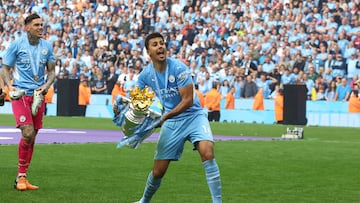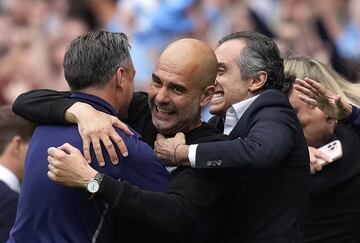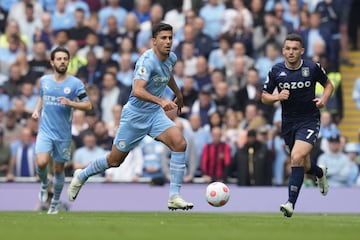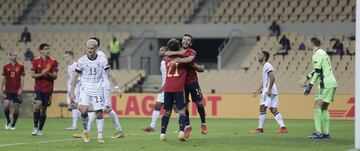Manchester City Rodri interview: Premier League title, Guardiola, World Cup...
The Manchester City midfielder spoke to AS about the recent Premier League success, the disaster against Real Madrid and what working with Guardiola is like.

Manchester City defensive midfielder Rodrigo Hernández, better known as Rodri, celebrated winning his second Premier League title under City coach Pep Guardiola on Sunday, after a dramatic final day saw the sky blues turn their match around to get the win that guaranteed them the league.
Rodri, originally from Madrid, joined City from Atlético Madrid in 2019, when the English club met his buy-out clause of €70 million ($79 million), a transfer record for the Etihad-based outfit. He signed a five-year contract.
Now 25, Rodri has been a full Spanish international since March 2018, having previously turned out for his country at Under-16, Under-19 and Under-21s.
With the season over, Rodri was back in his native Madrid, and dropped in to the AS newsroom to talk football…
Rodri interview
It’s only been 48 hours since you won the Premier League title…
It was a special celebration. It’s the first time we could celebrate the title with the fans, because the previous one with the covid situation wasn’t the same. I remember the final whistle and how the supporters ran onto the pitch. I said to my teammates: “In years to come we’ll look back and realise this was a unique moment.” It’s everything: winning my second Premier League, winning four of the last five and what’s more beating the best Liverpool side in history.
What do you feel now that the success has sunk in?
It’s a source of pride to be part of this great team created by Txiki Begiristain and Guardiola. Winning the Premier League is the reward for the huge effort put in, in every sense. It’s the toughest competition there is. Added to that is winning the title the way we won it. We had the sensation we were losing all the work of nine months. It was slipping away from us. That’s why after the comeback people were crying, euphoric.
[City needed to win to be certain of claiming the title, but were losing 0-2 to Aston Villa, with Liverpool needing just a goal at that point to claim the title. City scored three in five minutes, and went on to win 3-2 to win the title]
Including Guardiola…
I saw Guardiola dancing, but only snippets [laughs]. To cry like he did comes from deep inside. It shows you how hard it is to win. We’ve had to get 93 points to be champions; last time it was 96. Liverpool lost two games in the entire season; we lost three. We knew whoever slipped up would finish without the title, it was so tough.

Did you know the score in the other game?
When we went to 0-2 I was praying for the result in Liverpool [to go our way]. I didn’t even know how it was going. And the guys on the bench fooled us. They were saying: ‘Keep going, keep going! It’s 1-1! 1-1!’ But the information is never definite, I didn’t trust it. I was thinking: “This sounds bad to me”. There was a lot of confusion and then the gaffer got the substitutes spot on, bringing on players who gave us so much: Zinchenko, Sterling, Gündogan… people who haven’t been regular starters too. They [Aston Villa] were having a decent game Gerrard [the Aston Villa coach] had set them up well. Gundo was key to make it 1-2. From that point on you’re right in it. You see it as possible.
And not only that, but you scored…
Afterwards Guardiola told me that Güdogan’s goals had been important, and that the fans had scored mine…! As if it’s easy to score a goal like that! [Laughs] I said to Zinchenko that the key thing had been his pass, because he hit it to me sharply. I thought about sending it to the back post, but I caught it for the near post and it went in. Olsen, the goalkeeper, who by the way is nearly 6 ft 7 inches (nearly two metres), almost got to it. I watch the goal now and say: “Thank goodness.”
You’ve scored seven goals in the Premier League
Yes, I’m happy to have taken a wee step up in my goal scoring. When you see that you’re always getting a bit more impact near the box and the opponents are defending well back, it’s normal to have a go. We haven’t had just one goal scorer, we’ve all scored. I think almost the entire squad have scored.
Tell me about Guardiola
He’s a natural hard worker. He’s there an hour and a half before training. At half-time he’s more about giving instructions than shouting. He conveys tranquility. He helps. Sometimes when we’re losing, I think: “He’s going to shout at us…” But no. He’s tends to be tougher when things are going well than when they are going badly. I remember one day we were winning and playing well and nevertheless he said to me: “What do you think you are, the best?”
Has this season been the best of your career?
Yes, my best year. You get better little by little, you adapt. There’s a period of acclimatisation that everyone needs. I’ve been understanding my role better, I’ve grown in that sense. Playing in midfield is the position where you need to master the most aspects of the game. I’ve always played with another midfielder alongside me, but I’m on my own now. Lillo said to me I’m like a guard dog. I need to protect what I have without losing it. I need to bark, but not always bite. If I get stuck in too early I can end up out of position. I’m happy. The club made a big effort for me and I want to repay all that trust.
Do you see your career carrying on in Spain or England?
In football you never know. I’m interested in projects where I can grow and I think that right now City’s project is spectacular.
And now Haaland is joining?
The Viking is joining! [laughs] He is a player who’ll change the way we play. We use a false 9, which gives you some things but also takes away others. It was clear to me that Haaland would fit in. We had a space in the squad that he is going to fill. He is an amazing physical specimen. After playing against them in Dortmund, I said to Rúben Días, who is also physically something else: ‘He battered right through you!” [laughs]
What about Manchester, is it red or sky blue?
When I got here, I was told that there are more City fans in the city and United fans around the country. I’ve always seen it as 50-50. I live in the centre. I was on my own for two or three years, but my girlfriend is here with me now. I prefer to soak up the city rather than being isolated on the outskirts - being able to go out and have a wander about. It’s different to Spain. In England the fans give the players more space when they bump into you.
What is the City dressing room like?
When I got here, legendary players like Kompany and Silva had just left. The dressing room is like the UN: there are Algerians, Portuguese, Spanish, French... There is a very good atmosphere. We speak a lot of Spanish. The English kit guys also help out. I can’t imagine a Madrid kitman throwing himself along the floor like ours in the dressing room in the title celebrations!
Is De Bruyne the boss?
He’s amazing, the best footballer I’ve ever played with. A modern midfielder. Nothing like Modric or Iniesta, for example. He plays so vertically, always close to the box.
Where’s the ‘Citizen’ Project headed?
Building a team with a clear idea. We’re missing Europe [the Champions League], that’s clear, but we’re close. Building the winning mentality too, I always say that. These years are giving us experience. Little by little we’re getting there: finalists last year, almost finalists this year…
How do you remember the disaster of the Bernabéu?
It was the worst day of my life. We finished shattered. I remember that Guardiola gave us two days off after it, he made us disconnect. That was key. When we got back he made us see that we had something else to fight for. We got our strength back.
What happened in those moments when the team switched off?
The key was in the first leg, I think. I ended up angry because I knew they’d got away alive. That was a game to score five or six goals. We knew what the Bernabéu is like, what can happen. In those minutes of madness it’s hard to organise yourself. Madrid were all over the place and they disorganised us. But we’ll try again. We’re a young generation.
How do you see the Real Madrid vs Liverpool final?
Liverpool are such a tough rival. Madrid is better on the big stage, but as a team Liverpool master every part of the game. Before they hurt you on the counter, now they’ve got so many more ways to attack you. They are solid in both boxes. Madrid have amazing players and experience. In a single game anything can happen.
Is the Premier League sufficiently recognised in Spain?
Can I be honest? [Laughs]
Of course.
Spanish footballers playing in the Premier League don’t have so much visibility [in Spain], that’s how it is. I see that it’s not followed so much, and it’s an amazing league. In England it’s different. For the English the most important thing I’d say is the Premier League, while in Spain there’s no debate: it’s the Champions League. I watch LaLiga. I’ve seen Atlético. Winning after winning is tough, but they still have a squad to compete with anyone.
Atleti made things tough for you with their super-defensive set up…
It was tough, yes. It’s one thing to experience it when you play with them, another when you play against them. The second half at the Wanda wasn’t good at all. Guardiola had reason to be angry.
What did you learn from their coaches?
Every coach is different. I’ve had Marcelino, Simeone, Guardiola and Luis Enrique. They are all different, but what characterises them all is how competitive they are. Simeone said to me: “I think you’re good with the ball, I’m going to push you when you don’t have it”. With Pep, for example, he moved me around. Now less so. And with Luis Enrique it’s different: he asks me to move forward if I’ve got space and the possibility to do so… In other words, each one with their own mentality makes you better.
Were you always a midfielder?
Yes, I joined Atlético when I was 12. In my first year, the coach, Fran Alcoy, put me there. I played at Rayo Majadahonda and had Lucas Hernández as a teammate. One year they signed him, the next, me. Then we were together again in the Atleti first team. Originally I was more of a number eight. My father told me he wanted me to play there, get into the box more. He didn’t like the defensive part. Until he saw that it’s the best.

Who were your heroes?
My hero was always Zidane, although I’m not very like him. [Laughs] In my time we had the Barça boom, that’s why one player I liked a lot was Busquets. Also Bruno and Senna at Villarreal, for example. I learnt so much from them when they were my teammates. From Xabi Alonso too, although his style is different. He’s more Premier League.
Busquets is your teammate too.
I’ve got a good relationship with him. He gives me advice. You’re either born with what he’s got or you’re not. Physically he’s not all that, but he knows how to adapt. Busi is the fastest midfielder, because in football speed is what gets you the ball. How you move it. Then there are other midfielders, like Casemiro, who is different but top class.
Can Spain repeat their successes?
That generation [who won the 2008 and 2012 European Championships and the 2010 World Cup] at the start weren’t so well recognised. We’re in that process. At the European Championships and the Nations League we’ve shown we can beat anyone. The problem is that it’s so hard to win titles, because the competition is so fierce. Let’s see this year. I think that having the World Cup in November means we’ll come in fully fit. There are still legendary players around like Busquets, for example, and my generation needs to be the next to step up. And after that come the small fry as I call them [laughs].







